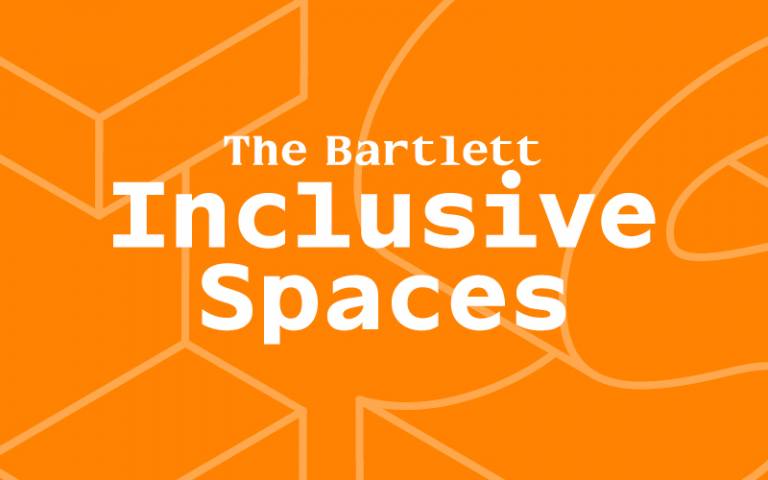Inclusive Spaces: Everyday Curriculums / Everyday Pedagogies
19 October 2022, 1:00 pm–2:00 pm

Join this interactive online event to explore how simple, everyday changes can create a big impact in built environment education.
This event is free.
Event Information
Open to
- All
Availability
- Yes
Cost
- Free
Organiser
-
The Bartlett Faculty of the Built Environment
What and how we teach built environment students has a direct impact not only on their experiences as learners, but also on the professions they go on to join, and the buildings, cities and human spaces they create.
It’s crucial for the future of our societies, and for our planet, that built environments represent and respect diversity in people, nature and animals. In this event we discover how education can help to achieve this by becoming more equitable and inclusive.
We’ll explore the power of language in creating more inclusive educational experiences, and share simple, everyday tools that can help educators to diversify curricula and pedagogies.
Through an interactive workshop, we’ll ask: what are the absent, but essential, ingredients missing from our current approach to built environment education? What can we do in our everyday practice that can bring about a seismic shift? How can we understand each other better, and co-create a new approach together?
We’ll take inspiration from Toni Morrison’s writings on the power of narratives as a principal means of sharing knowledge and learning, and on using intention in our everyday language to signal and create change.
The conventional wisdom of the Tower of Babel story is that the collapse was a misfortune. That it was the distraction or the weight of many languages that precipitated the tower’s failed architecture. That one monolithic language would have expedited the building, and heaven would have been reached. Whose heaven, she wonders? And what kind? Perhaps the achievement of Paradise was premature, a little hasty if no one could take the time to understand other languages, other views, other narratives. Had they, the heaven they imagined might have been found at their feet. Complicated, demanding, yes, but a view of heaven as life, not heaven as post-life.
Toni Morrison - The Nobel Lecture in Literature, 1993
Led by The Bartlett Equality, Diversity and Inclusion (EDI) group, the Inclusive Spaces monthly series presents the latest research and ideas from The Bartlett’s world-leading thinkers on all dimensions of diversity in the built environment.
About the Speakers
Amy Kulper
Director of The Bartlett School of Architecture
Amy Catania Kulper is an architectural educator, administrator and innovator, whose teaching and research focus on the intersections of history, theory, criticism and design. She was previously Head of Architecture at Rhode Island School of Design (RISD), and has taught at the University of Cambridge, the University of California, Los Angeles (UCLA), the Southern California Institute for Architecture (SCI_Arc), and the University of Michigan.
Felicity Atekpe
Director of Professional Practice in Architecture Part 3, The Bartlett School of Architecture and Founder of White Table Architects
Felicity is a practicing architect and the founder of White Table Architects, a practice specialising in sustainable design, interiors, architecture and landscape. Her academic interests include innovative pedagogies, which address the role of education, ethics and alternative routes to qualification, with a focus on addressing vertical and horizontal inequalities in current systems.
Sara Shafiei
Vice-Dean Equality, Diversity and Inclusion at The Bartlett, Faculty of the Built Environment, UCL and Associate Professor (Teaching) at The Bartlett School of Architecture
Alongside her role as Vice-Dean Equality, Diversity and Inclusion, Sara is an Associate Professor (Teaching) at the BSA, and Director of the new MSci Architecture Programme. Previously, she has taken on roles including Departmental Tutor, Admissions Tutor, Chair of Board of Examiners, and Chair of Architecture Programme Committee (APC1).
 Close
Close

